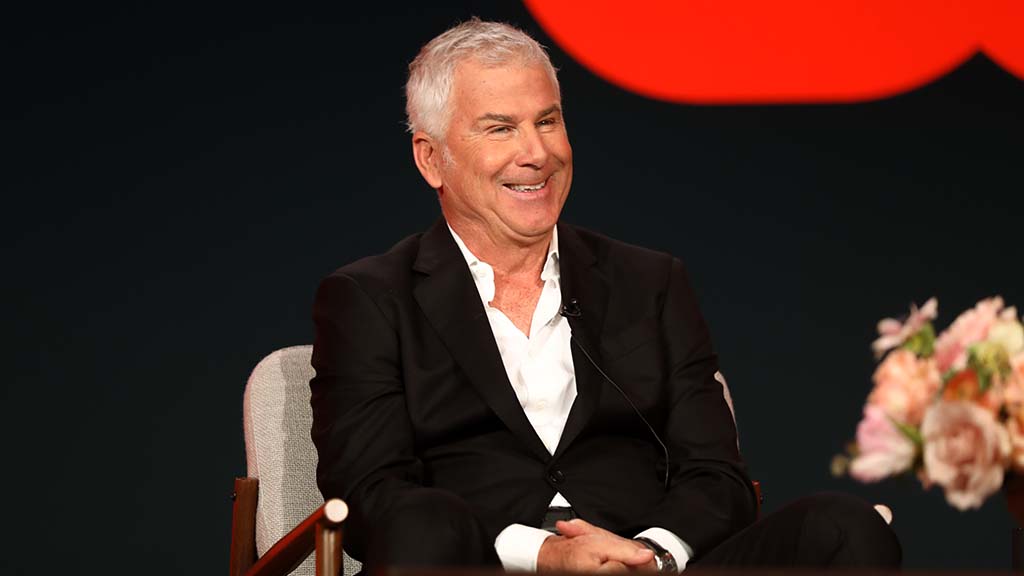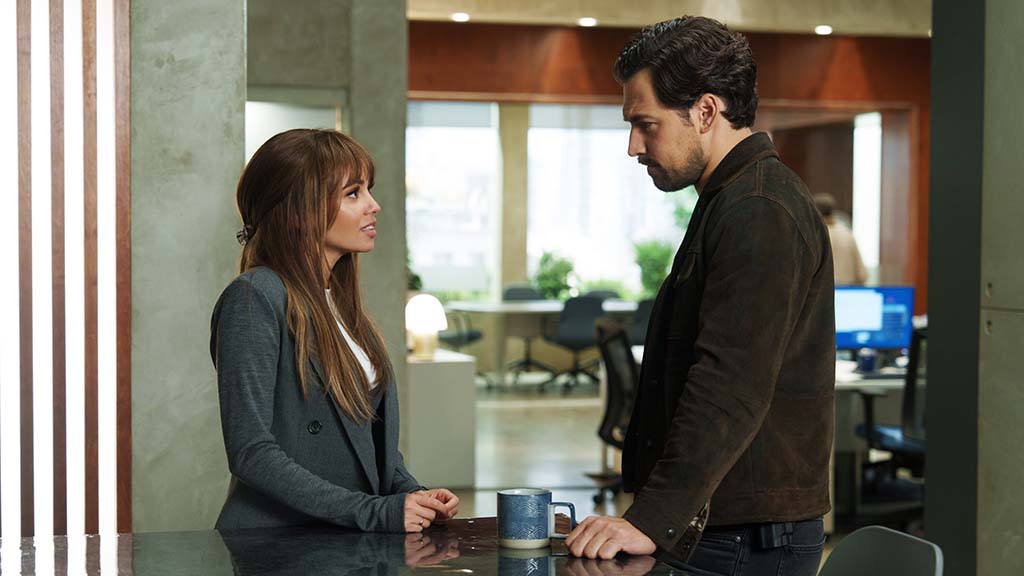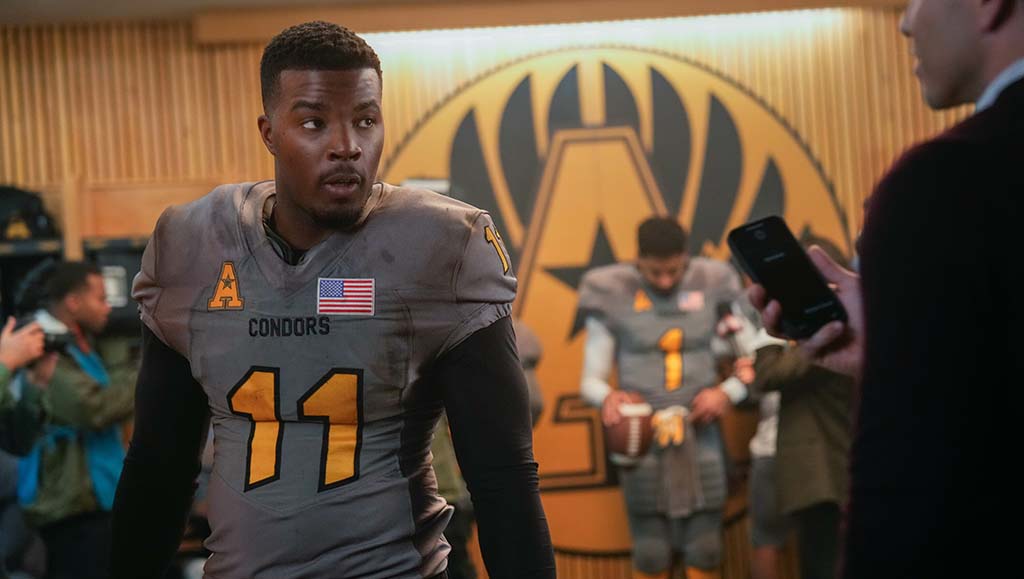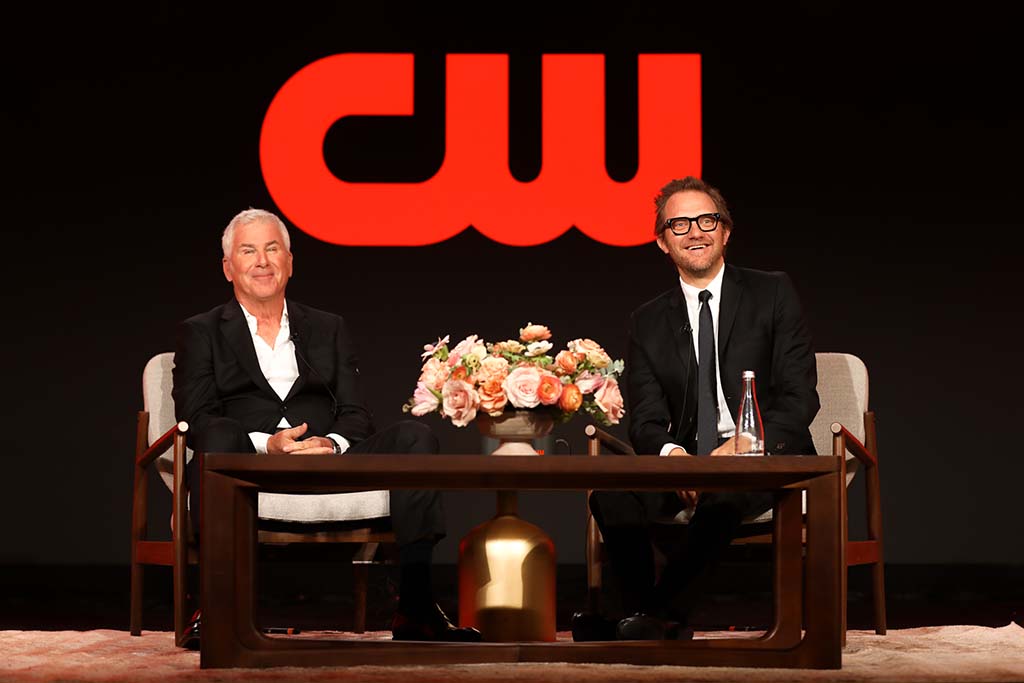
Dennis Miller took over as president of The CW in October 2022, after the network was acquired by Nexstar Media Group. He quickly set about refashioning The CW by bringing in more live sports, decreasing the number of scripted series that are exclusive to the network and deploying a coproduction model that sees series air on The CW and another network in a different country. Those include Wild Cards, about a cop and a con woman working together, and Sullivan’s Crossing, about a woman who leaves the big city to live on the campground run by her estranged father. Both also air in Canada.
Miller spoke with Broadcasting+Cable about his eventful first 18 months atop The CW, including the network’s shift away from the younger demo it once targeted, and what is next. Here’s an edited transcript of that conversation.
B+C: The CW has bet big on sports — LIV Golf, ACC football and basketball, NASCAR. What’s next in terms of sports?
Dennis Miller: I think there’s going to be a lot of opportunities on the edge. A variety of folks are acquiring and/or licensing sports assets right now, and some probably have more than they can really handle. I think a lot of the leagues and the IP holders — the schools, the athletes themselves — are saying, ‘Hey, I want broad reach.’ So notwithstanding that the deep-pocketed streamers in many cases can write pretty sizable checks to acquire things, I think a lot of the IP holders want to be seen in 100% of the country because they’re reaching out to attract alumni, to grow their endowments, grow their sports programs. I think a lot of the traditional incumbents are going to create opportunities where we can insert ourselves.
We've got a pretty full slate. We’ve got 500 hours [of sports content annually] as of 2025. And the only place we’d really like to find something would be Sunday afternoons, because that is relatively open for us right now, other than some golf tournaments.
B+C: How is LIV Golf doing this season?
DM: It’s up about 25%. I think the addition of John Rahm was very helpful. They have a number of players who are in The Masters coming up [April 11-14]. And as soon as you get near The Masters, you have this gravitational pull and everyone gets focused: Now that [NCAA] basketball’s over, it’s gonna be all Masters all the time.
LIV has been doing more promotion with the golfers. When we have U.S.-based events, we obviously do much better because time zone-wise, they comport with how people like to watch golf.
LIV opened up all sports for us. As soon as we announced that deal, the phone started ringing — ‘Oh, I see you guys are doing sports.’ That begat the ACC conversation and the Inside the NFL conversation and all the other stuff that we've added.
B+C: How did Inside the NFL do in its first season?
DM: In the beginning, it was probably a little softer than we had hoped. Since it skews fairly male in a broadcast schedule that was fairly balanced, it took a little while to find its way. We don't have a flywheel like the other networks do, where they can promote from their sporting events on Saturday and Sunday into Tuesday. So in the beginning it was trying to find its sea legs.
They were also testing out different people to host, seeing how Ryan [Clark] was going to do. Now we’re in a place where we know how to reach out to the audience, how to find the audience. We ended up making a deal with two other parties — the NFL Network, where it runs at midnight after us, and on Netflix. So we’ve had three outlets to start creating some awareness amongst the various parties as to where to find it.
I’d say the first year was a little softer than we had originally hoped, but now that we’ve got a lot more sports to surround it with, especially on weekends, we're pretty hopeful going into the new season.
B+C: Is Ryan Clark coming back as the host?
DM: Absolutely. His credibility as an analyst allows us to get a lot of other people to participate in the show and do cameos and all the extracurricular stuff. He’s kind of got the Good Housekeeping seal in the NFL broadcasting world.
B+C: During the TCA Winter Press Tour, president of entertainment Brad Schwartz stressed that the Canadian scripted shows on The CW aren’t ‘imported,’ they’re typically coproductions. Will that be a big part of the primetime model going forward?
DM: I think Canada will be one part of the model. Brad’s done a lot of work there and reminds me frequently that he’s Canadian and loves hockey. Obviously, the tax advantages, the lack of accents, the easy ability to move back and forth, between crews and getting talent up to Vancouver and Toronto, makes it very attractive.
What you're seeing now in places like Australia, New Zealand, Serbia, Bulgaria, big tax advantages, great scenery and high-quality crews. Previously, you weren’t able to pull enough money out of the international market to make some of these coproductions viable, but I think that’s changed dramatically. So there’s a situation where we can be the domestic home for broadcast for a couple of runs. We don't have any streaming business, and who knew that would be a wonderful place to be in today's world? So we can partner with someone who has international capabilities, who may or may not have a streaming capability here, and be a piece of that puzzle.

B+C: What among the coproductions is working out well?
DM: We’re very happy with Wild Cards [coproduced with CBC Television]. It was just kind of the right show. We were moving away from some of the young-adult stuff because broadcast skews older and young adults typically are bingeing when they want to watch something, as opposed to waiting until Wednesday at 8 p.m. to find their show. So as they moved out of broadcast, it was like, what kind of shows are going to work for audiences that will be good lead-ins to the 10 o’clock news on our affiliates? Wild Cards was the first show where we said, ‘OK, we’ve got an attractive cast, we’ve got a fun, light-hearted show that people can tune into without having to know all the backstory.’
We got lucky, because It's a little bit of magic in this business. There was great chemistry between the two leads [Vanessa Morgan and Giacomo Gianniotti].
B+C: How many seasons do you see All American going?
DM: It’s kicked off to a really nice start. [Season six began April 1.] We’re going to watch this one closely. That’s up to Warner and ourselves and the cast. It’s had a really nice run. We've got a very interesting storyline that runs through this season.
I would imagine, after five or six airings and we see how it does, both on broadcast and digital, we will come to a determination.
B+C: Brad at TCA had mentioned The CW taking on the blue-sky motif in scripted that other networks like USA Network had abandoned. Is that an accurate description of the network’s scripted shows?
DM: Very. Jeff Wachtel is doing one of the shows for us, and he ran USA, and Heather Olander, who works with us [head of unscripted programming], was at USA, too.
That kind of comfort food that’s breezy and positive and easy to pop into and out of — if you look at how viewers are coming to broadcast now and what’s working out there, the more complicated plot lines, the darker stuff, is obviously the domain of streamers, and there’s some amazing content out there. We often have people who've made shows for streamers or even the streamers themselves talking to us, saying, would we be interested in a second run here? Some of this stuff for sure. But a lot of it just wouldn’t work in broadcast, which demands too much of an audience to show up at a particular point in time and pull into a show where they understand what’s going on with the characters.
The more we’re doing this, and it’s early days, we're seeing that the kind of entertainment that people can easily find, relate to, enjoy the actors and actresses and not have to be so deeply engaged that they can lean back — broadcast seems to work very well.
B+C: Sherlock Holmes is a character that we’ve read and seen for decades. What stands out about the CW project Sherlock & Daughter?
DM: One, we’ve got some terrific casting that we were able to secure at the very last minute. We like the production team that's involved and we wanted to take a more whimsical approach here. And in a world with so much noise, you better find some IP that people at least say, ‘Oh, OK at least I have a general idea that I'll be with this colorful sleuth trying to uncover a mystery here.’ We've wanted to stick with things that were premarketed.
B+C: How’s Brad Schwartz working out?
DM: I couldn’t be happier. He’s so passionate about whatever asset that he’s working with. I had the good fortune of working with him at what was TV Guide [Network] and then turned into Pop TV. I knew who I was getting into business with. I wanted someone who was well-liked in the creative community, who had a lot of marketing chops. I knew we needed to be scrappy, that we would have limited marketing budgets, that we had to rebrand The CW because it was really a beloved brand amongst its constituents there, but the world had changed. So how do you go through a rebranding exercise?
Brad checked all those boxes and was a known commodity. We’re a good yin and yang.
B+C: You got Trivial Pursuit and Scrabble game shows in the works. Why are those right for The CW?
DM: Once again, preexisting IP. In a noisy, fragmented television landscape, you need things where audiences already know what they're going to walk into. Those were obviously two well-known games from Hasbro and Mattel. We were able to make a deal with eOne right while it was selling to Lionsgate there. And we’re very close with the Lionsgate folks — I used to work there and we trust them completely in their ability to produce good shows. So it was really quality IP that was already well-known to consumers.

B+C: Are you looking for more game shows?
DM: We'll see how these do. There’s not a lot of well-known titles that are still available, but we snoop around over in Europe and elsewhere.
B+C: How do you describe The CW brand in 2024?
DM: Obviously we’re broadcast-centric, which isn’t really a brand definition, but because of the ownership — Nexstar has 30-plus CW affiliates, so we wanted to make sure that the value of those continues to grow and not just [have them] be a set of rerun broadcasters.
Blue sky and friendly and comforting are all words that we want to be able to provide the consumer. We want to be sports-centric. Sports and news drives a lot of what’s working in broadcast.
As this thing unfolds and we see how audiences respond, we’ll put the fuel on the stuff that works and we’ll fail fast on things that don’t.
Underdog’s probably a good word because The CW was always one of the smaller broadcast networks compared to the Big Four. And if you look at the sports that we've picked up, whether it's LIV taking on the PGA or NXT leading into WWE or Xfinity [NASCAR] leading into the Cup, you're seeing a trend of the next generation of sports talent here. We're not playing for the NFL. I think underdog’s a really good definition of who we are.
B+C: Nexstar owns NewsNation. Will there be more NewsNation content on The CW?
DM: I think so. With Crime Nation, we were able to tap into their broadcasters. Dan Abrams was all over the Curb Your Enthusiasm finale, which was very interesting. They’ve got this great newsgathering capability. You’ve got talent like [Elizabeth] Vargas and [Chris] Cuomo and Abrams that people already know and have done lots of different kinds of docs and specials here.
In the beginning we wanted to get The CW turned around, get the right people in place. But I think you’ll see a lot of smart collaborations, and us doing more and more where it works.
B+C: What do you hear from [Nexstar chairman/CEO] Perry Sook about The CW?
DM: A lot. I think it’s one of the three or four initiatives in the company that he is highly focused on. I remember as a board member, when we were discussing acquiring The CW, and I came to understand what the previous regime was delivering for affiliates, because it really was not broadcast-centric at the time. So I had a front-row seat to what the strategic decision was to get involved with The CW. From Perry's vantage point it was, ‘Hey, I want to play offense and defense here. I want to make sure that we have the kind of product that broadcasters want first and foremost.’ And so sports became a very important part.
He’s very involved. He watches the programming. He was just out for a couple days for strategy meetings about where we go from here, what's working, what's not working, are there other sports that we can add? He constantly uses as a refrain Moneyball to say, how do we identify IP, sports and otherwise, and that we do the deals on a financially sound basis? We have the backdrop of the RSNs not doing it on a financially sound basis. And when they imploded, that created opportunity for us to be talking to a lot of the teams and leagues.
He didn’t start with one station and get to be the biggest broadcaster without paying attention to the details. So I hear from Perry a lot. It’s a treat to be working with a founder. There's not a lot of founder-driven companies left in the business today.

B+C: What’s your take on broadcasting in general?
DM: When I went into the venture capital business and left the television business, because I'd been in cable with Turner and I'd been overseeing Sony’s TV business for a number of years, I would not have said, 20 years ago, ‘Oh my God, local broadcast will be fine.’ But as I learned, first being on the Nexstar board, and saw how that business was run and the unique place that local fits into the American psyche, I was like, ‘OK, this isn't really going anywhere.’
It may have been a 50% margin business and it’s now a 35% margin business. But I can't believe how resilient this has been. People want to see the people and events and things that happen around them. They care about their local sports, they care about their favorite teams, they care about what’s happening in the news around them.
Nobody knew that you could deliver news product at this level and still find significant audiences, and you can do it at three or four stations in a market and still have very significant audiences.
With Perry leading the charge on retrans, the second revenue stream that really propped up broadcasting in a significant way, the MVPDs have seen the power of having local in their mix of offerings and not just being a kind of single-purpose product.
I was very surprised when I got to The CW and started talking to the station groups, ours and Tegna, Sinclair, Scripps and others, trying to understand what they were looking for. I was like, huh, not getting an SVOD proved to be a very good strategy of staying out of that huge money suck that has been that business.
The business still has really good margins. The company has low leverage, really good cash flow and then add political to it — this really messed up political climate that we’re in that’s so polarized creates huge dollars. Those factors mean that we’re not going anywhere. That 100% reach is going to be a big advantage and that focus on local matters to consumers.







